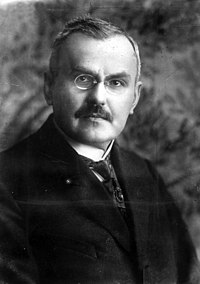Władysław Grabski
| Władysław Grabski | |
|---|---|

Władysław Grabski
|
|
|
Prime Minister of Poland 11th Prime Minister of the Second Republic of Poland |
|
|
In office 19 December 1923 – 14 November 1925 |
|
| Preceded by | Wincenty Witos |
| Succeeded by | Aleksander Skrzyński |
|
Prime Minister of Poland 4th Prime Minister of the Second Republic of Poland |
|
|
In office 27 June 1920 – 24 July 1920 |
|
| Preceded by | Leopold Skulski |
| Succeeded by | Wincenty Witos |
| Personal details | |
| Born |
Władysław Dominik Grabski 7 July 1874 Borów, Warsaw Governorate, Congress Poland |
| Died | 1 March 1938 (aged 63) Warsaw, Poland |
| Resting place | Powązki Cemetery, Warsaw |
| Nationality | Polish |
| Political party |
National-Democratic Party Popular National Union |
| Spouse(s) | Katarzyna Lewandowska (since 1902) |
| Children | 4 |
| Occupation | Politician, economist |
| Signature | |
Władysław Dominik Grabski (pronounced [vwaˈdɨswaf ˈɡrapskʲi]; 7 July 1874 – 1 March 1938) was a Polish National Democratic politician, economist and historian. He was the main author of the currency reform in the Second Polish Republic and served as Prime Minister of Poland in 1920 and from 1923–1925. He was the brother of Stanisław Grabski and Zofia Kirkor-Kiedroniowa.
He was responsible for the creation of the Bank of Poland and implementing the Polish currency. Grabski’s cabinet became the longest standing cabinet in the interwar Poland. At the same time, however, Grabski’s cabinet was severely criticized. Stanisław Głąbiński, for example, criticized Grabski’s inefficiencies in the sphere of international relations, and Wincenty Witos disapproved of Grabski’s deficient agricultural reform, as well as his inability to inform the public of the state’s real financial situation.
Władysław Grabski was born in 1874, in a family manor in Borów (a part of Gmina Bielawy) near Łowicz, Congress Poland, Russian Empire. He studied politics at the School of Political Science in Paris and history at the University of Sorbonne. While in Paris, Grabski’s political views changed. He abandoned the socialist ideas and turned more towards the right.
The years Władysław Grabski had spent in Paris became an impetus behind Grabski’s desire for his involvement in the Polish government. Soon after Grabski’s return from Paris, in 1905, he founded the Agricultural Society in Łowicz, in central Poland. The Society quickly won the support of many peasants, which in turn led to the creation of the National Labor Union. Due to the growing autonomy and strength of Grabski’s Agricultural Society and the Union, in 1905, Władyslaw Grabski was arrested by the Russian authorities and imprisoned in Warsaw. Grabski’s imprisonment, however, lasted less than a year. In 1905, Grabski was elected on behalf of National Democracy as a member of three successive sessions of the Duma, the legislative assembly of the Russian Empire. He was a deputy in Duma until 1912. It was at that time that he became involved in the work of the budgetary commission with the Russian Ministry of Agriculture. Grabski’s involvement in the budgetary Commission became an reason for his later desire to become the finance minister in the Polish parliament. When World War I broke out, he organized the Central Citizens' Committee, which was responsible for restoring order into the life of a society devastated by the Polish partitions, and to represent the interests of Polish people before the Russian authorities. He also became a member of the Polish National Committee. In 1919 he entered the government of the newly restored Poland as Minister of Agriculture.
...
Wikipedia
